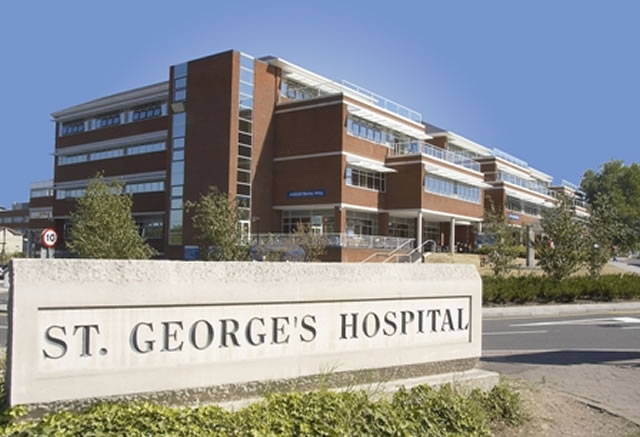St George's Hospital Trust No Longer in Special Measures
New report shows local NHS service provider 'requires improvement'

St George's Healthcare NHS Foundation Trust has been taken out of special measures but still ‘requires improvement' according to a new report released today.
The report by the Care Quality Commission recommended that the Trust, which covers St George's hospital in Tooting and Queen Mary's hospital in Roehampton, is taken out of special measures for the quality of its services.
The report highlights issues with ageing buildings and staff keeping documents confidential and controlling infection risks. Waiting times in A&E were also not meeting the national standard.
The Trust had been in Quality Special Measures since November 2016 and Financial Special Measures since April 2017.
It praised its service for children and young people which is now rated as ‘Outstanding.'
It was rated ‘Good' for being caring, but remains on ‘Requires Improvement' for being safe, effective, responsive and well-led.
Inspectors assessed the urgent and emergency department at St George's Hospital, as well as medical care, surgery and services for children and young people and outpatients.
At Queen Mary's Hospital, only surgery was inspected.
These services were all rated ‘Requires Improvement' after the previous inspection carried out in March 2018.
Some key positives from the report for St George's were 'evidence of outstanding practice in the emergency department.”
Here a ‘hot lab' was able to produce a full blood count within minutes that can help to pinpoint which antibiotics to use and cut waiting times.
The emergency department were also able to test for flu quickly, reducing the use of unnecessary anti-viral medicines and the number of patients being isolated unnecessarily.
In surgery, the team had developed a ‘Get Set 4 Surgery' programme that was recognised for helping patients prepare for having an operation from surgical assessment to discharge and recovery at home.
Surgery at St George's Hospital improved to ‘Good'. But the report identified some key issues that must be improved.
Inspectors said the Trust must make sure consent is correctly recorded in patients' notes in line with best practice and that all patient records should be stored securely, completed accurately, and kept confidential.
The report noted that in the emergency department, casualty cards were unsecured in the cubicles and in surgery at St George's Hospital, some patient identifiable information and ‘do not resuscitate' forms were in folders that were not marked as confidential.
The emergency department was also told it should complete all documentation correctly, check all equipment is clean and safe for use and display information about how to raise a concerns in all patient areas.
The report said services did not always control infection risk well, and that they saw examples of staff not washing their hands between patient contact.
It also noted that the estate is 'ageing” and 'at times was a risk to patient safety. While the trust had taken some actions to control the risk, such as filters on taps to prevent legionnaires disease and flushing the pipework regularly to prevent leaks, this was described as an 'ongoing challenge”.
People were also not able to access services in a timely way, and the report said that the Trust was not meeting the emergency department national standard to admit, treat or discharge patients within four hours.
In medical care the Trust was told it should continue work to improve vacancy, sickness and turnover rates among its nursing staff and reduce the number of patient moves at night.
At St George's the rating for responsive and well-led in the medical care department decreased from ‘Good' to ‘Requires Improvement.'
In surgery at Queen Mary's, the Trust was told it should ensure senior staff are clear about who has overall responsibility and oversight of surgery and improve staff awareness on learning from incidents.
The responsive rating at Queen Mary's Hospital in surgery reduced from
‘Good' to ‘Requires Improvement.'
However, the report noted that there has been progress within the culture of the trust.
Professor Ted Baker, England's Chief Inspector of Hospitals, said: 'There has been significant improvement at St George's University Hospitals NHS Foundation Trust and I was pleased to see that. However, the Trust needs to work hard to improve its overall rating in the future.
'I have recommended to NHS Improvement that the Trust is ready to be taken out of special measures, provided some continuing support is still in place.”
Jacqueline Totterdell, Chief Executive at St George's University Hospitals NHS Foundation Trust said: 'This is a really positive and significant step forward for the organisation – and all the credit goes to our staff.”
She highlighted the significant improvement in children and young people's services.The Trust is in the process of rolling out a new scheme to provide every primary and secondary school with an emergency asthma kit, which is believed to be the first initiative of its kind in London.
It also arranges weekly meetings for parents on the hospital's neonatal unit at St George's, as well as pagers for parents so staff can easily contact them once their children are out of surgery,
Ms Totterdell added: 'Many of our core services have seen an improvement in their rating and, crucially, the CQC has recommended that we are taken out of quality special measures, which is just reward for the focus our staff have put on patient care in recent years.
'We know there is more work to do, but today's report confirms that we are edging closer to our ambition of providing outstanding care, every time for patients, staff and the communities we serve.”
Sian Bayley, Local Democracy Reporter
December 20, 2019
Related links
|